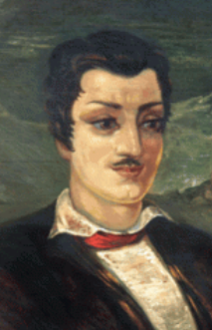Besiki

Besarion Gabashvili, commonly known by his pen name Besiki, (b. 1750, Tbilisi – d. February 4, 1791, Iași, Romania) was a Georgian poet and political figure.
Besiki received education at the royal court of the Kingdom of Kartli-Kakheti. His father, Zakaria, was a confessor of King Teimuraz II. Besiki's poetic works show knowledge of both Eastern and Western literature. The poet's friends at the court of Erekle II were prominent figures and writers: Levan Batonishvili, commander David Orbeliani, David the Rector and others. It was during these times that the majority of Besiki's poetic masterpieces were created. The conflict between Zakaria Gabashvili and Catholicos Anton I ended with Zakaria's banishment from Kartli-Kakheti. This played an important role in Besiki's life.
From the 1770s, Besiki was at the court of King Solomon I of Imereti. The king appointed Besiki as a chancellor. He traveled to Persia on a diplomatic mission to Karim Khan in 1778, but found him dead; and the civil wars there ultimately made it impossible to use Persia against the Ottomans. After Solomon I's death, Besiki supported the accession of David II to the throne of Imereti. In 1787, King David assigned Besiki a special mission: to ask Russia for protection, to conclude a treaty similar to the one concluded between Russia and the Kingdom of Kartli-Kakheti in 1783, and to bring an auxiliary army to Imereti. For this purpose, Besiki arrived in Kremenchuk to meet Grigory Potemkin, the commander of the Russian troops operating in the south. Besiki moved with Potemkin's camp first to Chișinău, and then to Iași, where he died.
Besiki's poetic heritage is diverse. He is the author of several poems and odes.
His heroic-patriotic poem For Aspindza is the story of the Georgian victory over the Ottoman-Lezgin army in 1770 and praised the Georgian heroes. The theme of the war is also addressed in the poem The Battle of Rukhi. Besiki and Davit Guramishvili, paved the way for genres of everyday life in Georgian writing. He also wrote several satirical poems.
Besiki's poetry is characterized by rich metaphorical thinking, sophisticated writing. He significantly improved the poetic technique, created new types of verse. A number of original metaphors of Georgian poetry are associated with his name (Garden of Sorrow, Downpour of Tears, Black Sparrows, etc.). Besiki's poems have been preserved in the form of numerous manuscript collections. Some of them include poems not only by Besiki, but also by his imitators, which makes it difficult to select authentic material. Nevertheless, it became possible to collect his poems and publish them first in 1885 and afterwards in 1962.
Literary work: ლექსნი, თქმულნი ბესარიონ გაბაშვილისაგან (1749–1791), ზ. ჭიჭინაძის გამოც., ტფ., 1885; თხზულებათა სრული კრებული, ა. ბარამიძისა და ვ. თოფურიას რედ., თბ., 1962; ლექსები, პოემები, წერილები, თბ., 2013.
Literature: ბ ა რ ა მ ი ძ ე ა., ნარკვევები ქართული ლიტერატურის ისტორიიდან, [ტ.] 2, თბ., 1940; კ ე კ ე ლ ი ძ ე კ., ქართული ლიტერატურის ისტორია, [ტ.] 2, თბ., 1958; მ ა ჭ ა რ ა ძ ე ვ., ბესიკი დიპლომატიურ სარბიელზე, თბ., 1968; ქართული ლიტერატურის ისტორია, ტ. 2, თბ., 1966; ც ა ი შ ვ ი ლ ი ს., ბესიკი, თბ., 1962; ჟ ღ ე ნ ტ ი დ., ბესიკის ენა, თბ., 1989; კ უ ჭ უ ხ ი ძ ე გ., ბესიკის შემოქმედების აღმოსავლურ-დასავლური ასპექტების ურთიერთმიმართებისთვის, XVI–XVIII სს. ქართული ლიტერატურა, თბ., 2012.
S. Tsaishvili
V. Macharadze


